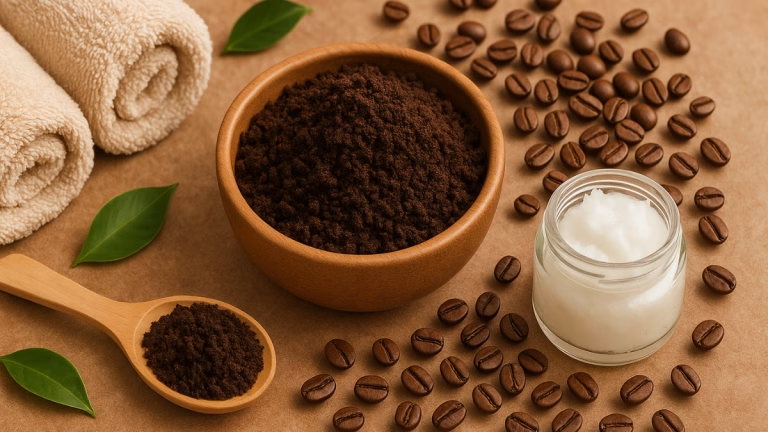
As people increasingly seek healthier ways to start their days, the unique benefits of caffeine in chai vs coffee have gained significance. While coffee remains the morning beverage of choice for many, chai tea offers a milder alternative that is rapidly gaining global popularity. Both beverages can provide an energy boost, but their unique benefits, such as coffee’s quick caffeine hit and chai’s steadier, more sustained energy, set them apart.
Hands gently cup a clear mug of warm amber tea, conveying a sense of peace and comfort.
Coffee typically delivers a quick caffeine hit, followed by an energy crash, while chai provides steadier, more sustained energy. This difference extends beyond just caffeine content – it’s about how your body processes these beverages and the additional compounds they contain.
How Much Caffeine is in Chai vs Coffee
The most significant difference between these beverages lies in their caffeine content. A standard 8-ounce cup of coffee contains 95-165 milligrams of caffeine, whereas the same amount of chai tea typically holds 0-60 milligrams. This means coffee delivers roughly two to three times more caffeine than chai.
Caffeine content comparison showing chai tea contains significantly less caffeine than coffee.
Different types of chai contain varying amounts of caffeine. Masala chai, made with black tea, falls on the higher end at 30-50 milligrams per cup, while chai lattes from coffee shops often contain 70-75 milligrams due to the use of concentrated chai syrups. Herbal chai blends made without black tea contain caffeine.
The preparation method has a significant impact on the caffeine levels in both beverages. Higher water temperatures extract more caffeine from tea leaves, with temperatures around 200°F pulling out 26% more caffeine than brewing at 160°F. Longer steeping times also increase caffeine extraction, although the effect levels off after about 5 minutes.
Understanding Energy Release Patterns
The way caffeine in chai versus coffee affects your energy differs dramatically due to the additional compounds in each beverage. Coffee provides rapid caffeine absorption, creating that familiar morning jolt within 15-30 minutes. However, this quick spike often leads to an energy crash 3-4 hours later as caffeine levels drop rapidly.
Chai tea, with its L-theanine content, helps counteract some of caffeine’s stimulating effects on the nervous system. Unlike coffee, which can increase stress hormones like cortisol, chai’s L-theanine promotes relaxation and reduces anxiety. This makes chai an ideal choice for those seeking a more calming energy boost, without the jitters or wired feeling that coffee can sometimes bring. It’s like a warm, comforting hug in a cup, offering a sense of reassurance and relaxation.
A warm cup of masala chai tea, garnished with star anise, is surrounded by cinnamon sticks, cardamom, and cloves on a wooden table.
L-theanine also counteracts some of caffeine’s stimulating effects on the nervous system. While coffee can increase stress hormones like cortisol, chai’s L-theanine promotes relaxation and reduces anxiety. This makes chai ideal for people who want energy without feeling wired or anxious.
Health Benefits Comparison
Both chai and coffee offer impressive health benefits, each excelling in distinct areas. Coffee is rich in antioxidants called polyphenols, which protect cells from damage and may reduce the risk of certain diseases. On the other hand, chai tea’s health benefits primarily stem from its spice blend, with ginger aiding digestion and reducing inflammation, cinnamon regulating blood sugar levels, cardamom supporting heart health, and cloves providing antimicrobial benefits. Understanding these health benefits can help you make an informed decision about your daily beverage, taking into account your health concerns.
Chai tea’s health benefits primarily stem from its unique spice blend. Ginger aids digestion and reduces inflammation, while cinnamon helps regulate blood sugar levels. Cardamom supports heart health, and cloves offer antimicrobial benefits. The combination creates a potent wellness drink that addresses multiple health concerns, making chai a reassuring choice for those conscious of their health. It’s not just a beverage, it’s a health tonic in a cup, providing a wealth of health benefits and keeping you informed about your health choices.
The antioxidant content in chai comes from both the black tea base and the added spices. This dual source often makes chai more antioxidant-rich than coffee, especially when using fresh, high-quality spices. Turmeric-enhanced chai blends provide additional anti-inflammatory compounds that coffee lacks entirely.
Side Effects and Safety Considerations
Coffee’s higher caffeine content makes it more likely to cause unwanted side effects. Common issues include jitters, anxiety, sleep disruption, and digestive problems. People sensitive to caffeine often experience rapid heartbeat, headaches, or feelings of restlessness after drinking coffee. On the other hand, chai tea’s gentler caffeine profile significantly reduces these risks, making it a suitable alternative for people who find coffee too stimulating. However, chai isn’t completely side-effect-free; consuming large amounts can still cause caffeine-related issues.
Chai tea’s gentler caffeine profile significantly reduces these risks. The lower caffeine content, combined with L-theanine’s calming effects, makes chai tea a suitable alternative for people who find coffee too stimulating. However, chai isn’t completely side-effect-free – consuming large amounts can still cause caffeine-related issues.
A warm mug of masala chai, garnished with cinnamon, whole cardamom pods, cinnamon sticks, and cloves.
Pregnant women need to carefully monitor their caffeine intake, especially when consuming chai versus coffee. Health experts recommend limiting total daily caffeine intake to 200 milligrams during pregnancy, making chai a better choice than coffee. An 8-ounce cup of chai contains about 25% of this daily limit, while the same amount of coffee provides nearly 75%.
Preparation Methods and Caffeine Control
Traditional chai preparation allows for better caffeine control than standard coffee brewing. You can reduce chai’s caffeine content by using cooler water, shorter steeping times, or adding more milk to your recipe. Adding extra spices while reducing the amount of tea leaves creates a flavorful chai with minimal caffeine. This flexibility empowers you to tailor your chai to your caffeine tolerance and taste preferences. With chai, you’re the master of your caffeine destiny, giving you a sense of control and empowerment over your beverage choices.
Fresh ginger is grated into a simmering pot of milk tea, surrounded by spices, loose-leaf tea, milk, and honey, illustrating the traditional chai brewing process.
Water temperature plays a crucial role in extracting caffeine from tea leaves. Brewing chai at 160-180°F instead of boiling water can reduce caffeine by up to 30% while preserving most of the flavor. The flavors. This technique works exceptionally well for evening chai consumption when you want to savor the flavor without stimulation.
Coffee preparation offers less flexibility for adjusting caffeine levels. While you can choose lighter roasts or decaf versions, standard brewing methods extract most of the available caffeine, regardless of the technique. This makes coffee an all-or-nothing choice compared to chai’s adjustable nature.
Commercial Chai vs Homemade Versions
Store-bought chai products often contain more caffeine than homemade versions, due to the use of concentrated tea extracts. Coffee shop chai lattes typically contain 70-95 milligrams of caffeine, which is comparable to the levels found in coffee. These commercial versions also contain added sugars and artificial flavors that mask chai’s natural complexity.
Traditional masala chai tea blend featuring black tea and a mix of aromatic spices including ginger, cinnamon, and cardamom.
Making chai at home gives you complete control over the caffeine content in chai versus coffee comparisons. You can adjust tea strength, spice ratios, and brewing time to create your perfect balance. Homemade chai also costs significantly less than commercial versions, while providing a better flavor and health benefits.
Fresh spices make a dramatic difference in the health benefits of homemade chai. Whole cardamom pods, fresh ginger, and high-quality cinnamon provide more active compounds than pre-mixed powders. This enhanced spice profile provides better digestive support and anti-inflammatory effects compared to processed alternatives.
Best Times to Drink Each Beverage
Timing matters when choosing between caffeine in chai versus. Coffee works best for morning energy boosts when you need maximum alertness quickly. Its rapid caffeine delivery makes it ideal for early workouts or important morning meetings.
Chai’s gentler energy makes it suitable throughout the day. You can enjoy chai in the afternoon without worrying about sleep disruption, unlike coffee, which can interfere with nighttime rest. The L-theanine in chai promotes better sleep quality when consumed earlier in the day.
A collection of spices, including cardamom, cinnamon, ginger, and star anise, alongside black tea and sugar, for preparing traditional masala chai.
Evening chai consumption requires attention to caffeine sensitivity. Most people can drink chai 4-6 hours before bedtime without sleep issues, while coffee typically needs 8-10 hours to clear your system. This makes chai a better choice for afternoon pick-me-ups or social drinking.
Cost Considerations and Value
The economics of caffeine in chai versus coffee favor homemade chai significantly. Quality loose-leaf tea costs approximately 10-15 cents per cup when made at home, while coffee ranges from 25 to 50 cents, depending on the bean quality. Commercial coffee shop versions of both beverages cost $3-6 per serving, making home brewing essential for budget-conscious consumers.
Chai’s ingredient versatility offers better value over time. A single spice collection can create dozens of different chai variations, whereas coffee requires different beans for variety. The health benefits of chai spices add nutritional value that pure coffee lacks, making each cup more beneficial for your well-being.
Making Your Choice
Deciding between caffeine in chai vs coffee depends on your energy needs, health goals, and caffeine sensitivity. Coffee suits individuals who require quick, intense energy boosts and can tolerate higher caffeine levels. It’s ideal for early mornings, pre-workout energy, or when maximum alertness is required.
Chai works better for sustained energy, stress reduction, and digestive health. Its gentler caffeine profile suits sensitive individuals, while the spice blend offers comprehensive wellness benefits. Provides more flexibility in preparation and consumption timing.
Infographic illustrating how daily coffee and tea consumption can reduce the risk of death at various intake levels.
Many people find success by alternating between the two beverages based on their daily needs. Coffee for urgent energy requirements and chai for steady, all-day energy create an optimal caffeine strategy. This approach maximizes benefits while minimizing the drawbacks of either beverage alone.
The caffeine in chai vs coffee debate ultimately comes down to personal preference and lifestyle factors. Both beverages offer unique advantages – coffee for immediate energy and chai for gentle, sustained vitality. Understanding these differences helps you make informed choices about your daily caffeine intake and overall wellness routine.

